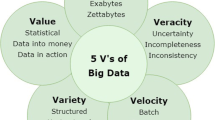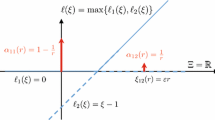Abstract
Real-life management decisions are usually made in uncertain environments, and decision support systems that ignore this uncertainty are unlikely to provide realistic guidance. We show that previous approaches fail to provide appropriate support for reasoning about reliability under uncertainty. We propose a new framework that addresses this issue by allowing logical dependencies between constraints. Reliability is then defined in terms of key constraints called “events”, which are related to other constraints via these dependencies. We illustrate our approach on three problems, contrast it with existing frameworks, and discuss future developments.
Similar content being viewed by others
References
Beck, J. C., & Wilson, N. (2007). Proactive algorithms for job shop scheduling with probabilistic durations. Journal of Artificial Intelligence Research, 28, 183–232.
Bidot, J. (2005). A general framework integrating techniques for scheduling under uncertainty. Ph.D. thesis, Ecole Nationale d’Ingèieurs de Tarbes.
Birge, J. R., & Louveaux, F. (1997). Introduction to Stochastic Programming. New York: Springer.
Bistarelli, S., Montanari, U., & Rossi, F. (2002). Soft constraint logic programming and generalized shortest path problems. Journal of Heuristics, 8(1), 25–41.
Charnes, A., & Cooper, W. W. (1959). Chance-constrainted programming. Management Science, 6(1), 73–79.
Davenport, A., & Beck, J. C. (2000). A survey of techiniques for scheduling with uncertainty (Technical Report). Available at: http://www.tidel.mie.utoronto.ca/publications.php.
de Kok, A. G., & Graves, S. C. (2003). Handbooks in operations research and management science: supply chain management: design, coordination and operation (Vol. 11). Amsterdam: Elsevier.
Fargier, H., Martin-Clouaire, R., Lang, J., & Schiex, T. (1995). A constraint satisfaction framework for decision under uncertainty. In Proceedings of the eleventh international conference on uncertainty in artificial intelligence, Montreal, Canada.
Freuder, E. C., & Richard, J. W. (1992). Partial constraint satisfaction. Artificial Intelligence.
Herroelen, W., & Leus, R. (2005). Project scheduling under uncertainty: Survey and research potentials. European Journal of Operational Research, 165, 289–306.
Hooker, J. N., Ottosson, G., Thorsteinsson, E. S., & Kim, H. J. (1999). On integrating constraint propagation and linear programming for combinatorial optimization. In Proceedings of the sixteenth national conference on artificial intelligence (pp. 136–141). Menlo Park/Cambridge: AAAI Press/MIT Press.
Jain, V., & Grossmann, I. E. (2001). Algorithms for hybrid MILP/CP models for a class of optimization problems. INFORMS Journal on Computing, 13, 258–276.
Jeffreys, H. (1961). Theory of probability. Oxford: Clarendon.
Kall, P., & Wallace, S. W. (1994). Stochastic programming. New York: Wiley.
Kingsman, B. G. (1985). Raw materials purchasing: an operational research approach. Elmsford: Pergamon.
Liu, B. (1995a). Dependent-chance goal programming: a class of stochastic programming (Technical Report). Institute of System Science, Chinese Academy of Sciences.
Liu, B. (1995b). Dependent-chance goal programming and its genetic algorithm approach (Technical Report). Institute of System Science, Chinese Academy of Sciences.
Liu, B. (1997). Dependent-chance programming: A class of stochastic optimization. Computers & Mathematics with Applications, 34, 89–104.
Liu, B. (1999). Uncertain programming. New York: Wiley.
Liu, B., & Iwamura, K. (1997). Modelling stochastic decision systems using dependent-chance programming. European Journal of Operational Research, 101, 193–203.
Liu, B., & Ku, C. (1993). Dependent-chance goal programming and an application. Journal of Systems Engineering & Electronics, 4, 40–47.
McKay, M. D., Beckman, R. J., & Conover, W. J. (1979). A comparison of three methods for selecting values of input variables in the analysis of output from a computer code. Technometrics, 21, 239–245.
Porteus, E. L. (2002). Foundations of stochastic inventory theory. Stanford: Stanford University Press.
Sengupta, J. K. (1972). Stochastic programming: methods and applications. Amsterdam: North-Holland.
Tarim, S. A., Manandhar, S., & Walsh, T. (2003). Scenario-based stochastic constraint programming. In Proceedings of the eighteenth international joint conference on artificial intelligence, Acapulco, Mexico (pp. 257–262).
Tarim, S. A., Manandhar, S., & Walsh, T. (2006). Stochastic constraint programming: A scenario-based approach. Constraints, 11, 53–80.
Vajda, S. (1972). Probabilistic programming. San Diego: Academic Press.
Wu, Y., Zhou, J., & Yang, J. (2005). Dependent-chance programming model for stochastic network bottleneck capacity expansion based on neural network and genetic algorithm. In Lecture notes in computer science : Vol. 3612. Advances in Natural Computation (pp. 120–128). Berlin: Springer.
Author information
Authors and Affiliations
Corresponding author
Rights and permissions
About this article
Cite this article
Tarim, S.A., Hnich, B., Prestwich, S. et al. Finding reliable solutions: event-driven probabilistic constraint programming. Ann Oper Res 171, 77–99 (2009). https://doi.org/10.1007/s10479-008-0382-6
Published:
Issue Date:
DOI: https://doi.org/10.1007/s10479-008-0382-6




